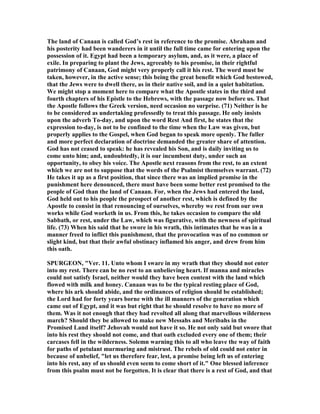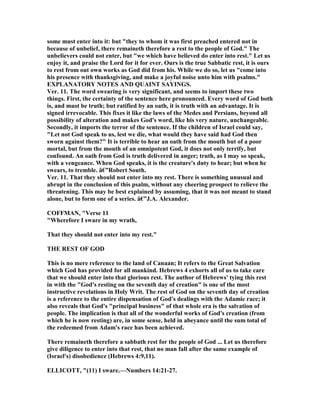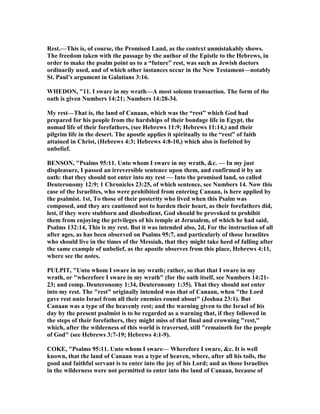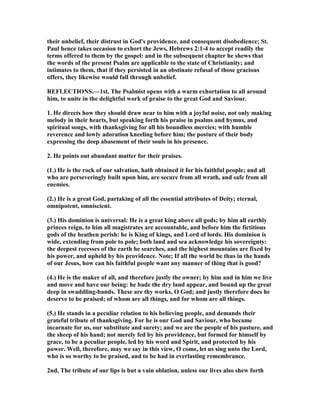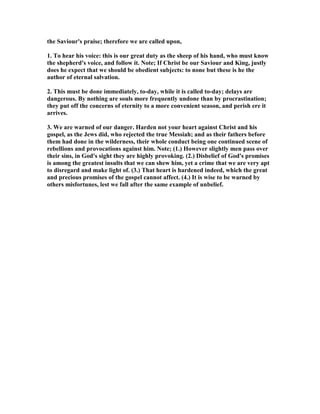Psalm 95 is believed to be authored by David and serves as an invitation for worship, blending joy and solemnity in its call to praise God, referred to as the 'rock of our salvation.' The psalm emphasizes communal worship, urging believers to express heartfelt gratitude and reverence towards God, while also warning against neglecting His service. It encapsulates themes of joy, unity in praise, and the need for humility in worship.
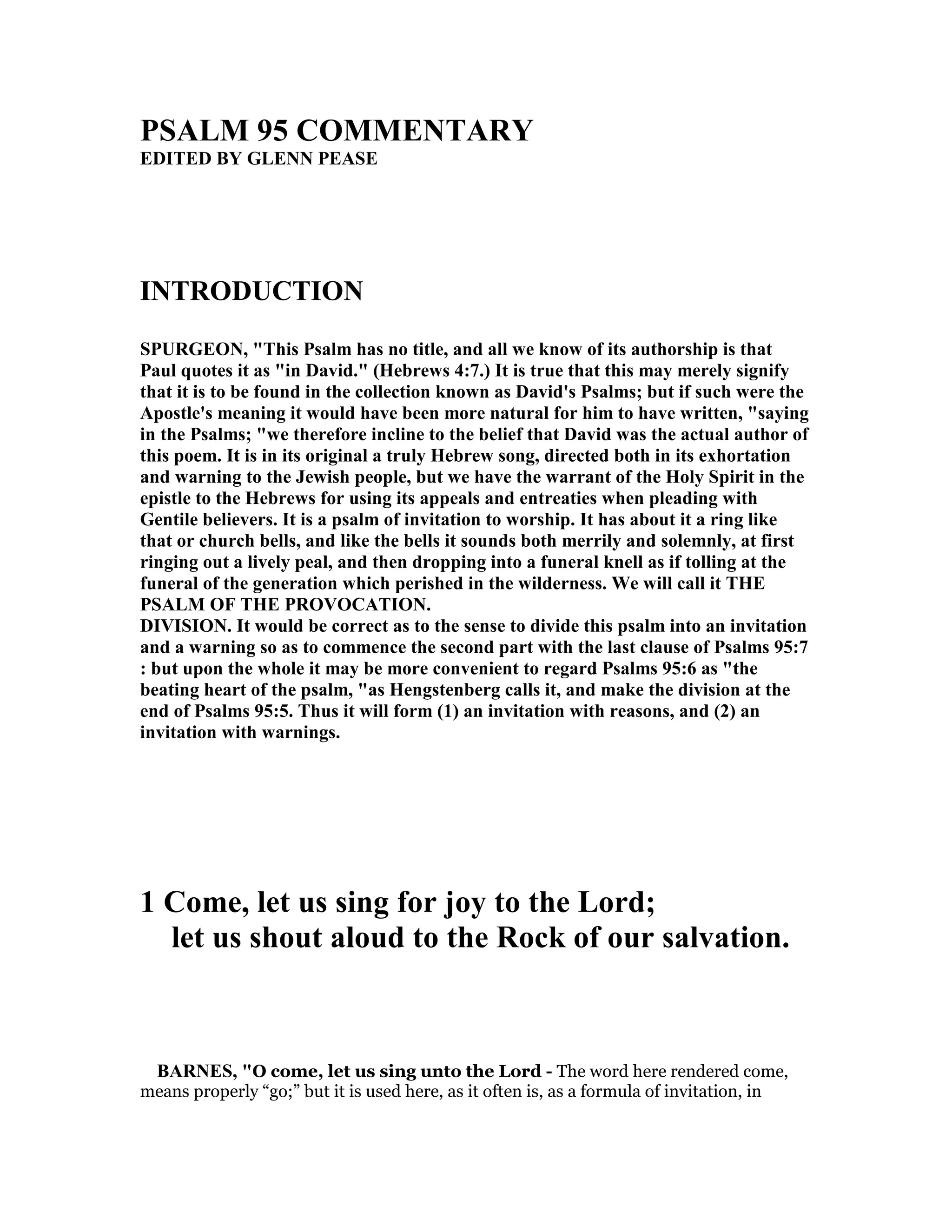
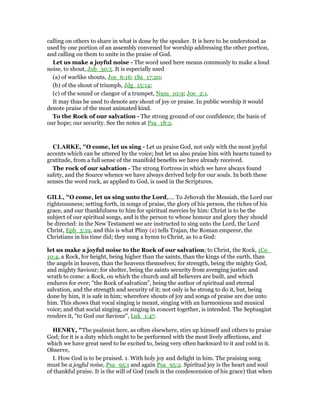
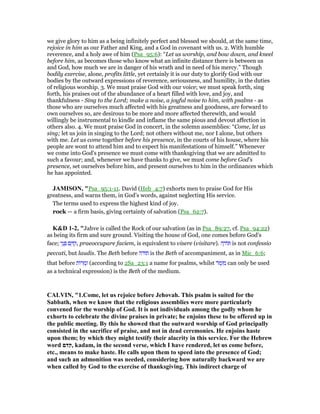
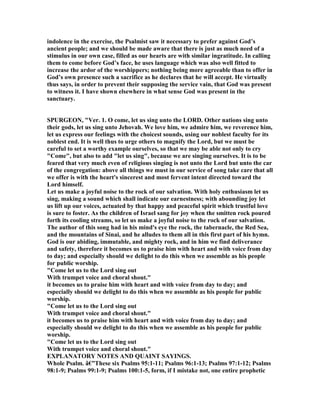
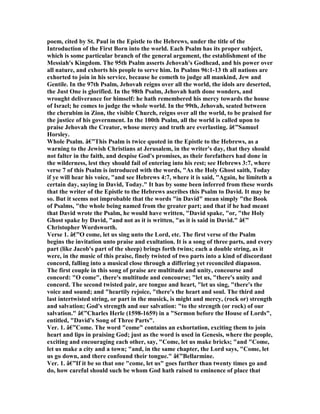
![their examples be Jacob's ladders to help men to heaven, not Jeroboam's stumbling
blocks to lie in their way, and make Israel to sin. —Charles Herle.
Ver. 1. —There is a silent hint here at that human listlessness and distraction of
cares whereby we are more prompt to run after other things than to devote
ourselves seriously to the becoming praises and service of God. Our foot has a
greater proclivity to depart to the field, the oxen, and the new wife, than to come to
the sacred courts, Lu 14:18, seq. See Isaiah 2:3, "Come ye, and let us go up to the
mountain of the Lord." —Martin Geier.
Ver. 1. Joyful noise. The verb eyrh, signifies to make a loud sound of any sort, either
with the voice or with instruments. In the psalms, it generally refers to the mingled
din of voices and various instruments, in the Temple service. This wide sense of the
word cannot be expressed otherwise in the English language than by a periphrasis. â
€”Samuel Horsley.
Ver. 1. The rock of our salvation. Jesus is the Rock of ages, in which is opened a
fountain for sin and uncleanness; the Rock which attends the church in the
wilderness, pouring forth the water of life, for her use and comfort; the Rock which
is our fortress against every enemy, shadowing and refreshing a weary land. —
George Horne.
COFFMA , "Verse 1
PSALM 95
A CALL TO WORSHIP A D A WAR I G AGAI ST U BELIEF
Scholars usually group the six psalms from Psalms 95 through Psalms 100 as
liturgical psalms, designed for use by the Israelites as they gathered for Sabbath day
worship. "This group of psalms seems to have been composed for use in the services
of the second temple."[1] Despite such opinions, there is a genuine possibility that
David is the author, as it is so assigned in the LXX, and besides that, the author of
Hebrews in the ew Testament quoted this psalm, stating that it was "in David."
This is alleged to mean merely that the psalm is "in the Psalter"; nevertheless, we
accept the real possibility that David did indeed write it.
This writer claims no skill in evaluating such conclusions as those suggested by
Yates (above), but they are included here as the convictions of dependable scholars.
I TRODUCTIO TO THESE SIX PSALMS
McCaw stated that the six suggest the possibility of an annual "Enthronement
Festival," but refrained from accepting such an "Enthronement Festival" as any
kind of certainty, declaring rather that, "Their abiding value is to enter into the
riches of Old Testament teaching regarding God, the Creator and King."[2] This
writer cannot find sufficient supporting evidence of anything like "An
Enthronement Festival" in the whole compass of Old Testament worship. If there
was really any such thing, why is it never mentioned in the Old Testament?
Psalms 95 begins with the knowledge of God imparted exclusively to Israel, with the](https://image.slidesharecdn.com/psalm95commentary-160617185945/85/Psalm-95-commentary-6-320.jpg)
![second portion of it providing a warning that Israel should not become unbelievers
as did their ancestors.
In Psalms 96, the exclusiveness of Israel is replaced with a universal call for all
nations and the whole creation to worship God. In this psalm, God appears, not
exclusively as the covenant God of the Hebrews, but as the Creator of the whole
world and the source of all truth and righteousness.
Psalms 97 stresses the knowledge of God as presiding over his whole Creation, and,
"As the faithful One whose goodness and holiness are always being disclosed to all
mankind through Zion."[3]
Psalms 98 is a song of praise, extolling the fact of salvation being known to the ends
of the earth.
Psalms 99 stresses the preeminence of Zion and honors great leaders such as Moses,
Aaron, and Samuel.
In Psalms 100, "We have an appeal for universal adoration of the Lord, Israel's
position as his chosen people, and the enduring quality of the Lord's mercy and
kindness."[4]
Psalms 95:1-3
A I TRODUCTIO TO PSALM 95
"O come, let us sing unto Jehovah;
Let us make a joyful noise to the rock of our salvation.
Let us come before his presence with thanksgiving;
Let us make a joyful noise unto him with psalms.
For Jehovah is a great God,
And a great King above all gods."
Although it is a fact that everyone is "always" in the presence of God in the ultimate
sense, yet there is a special way in which men who are assembling for worship do
indeed "come into God's presence." In this light, these verses are a beautiful and
proper call to worship in churches all over the world even today.
Coming before God with praise and thanksgiving is the very essence of worship.
"A great God ... a great King above all gods" (Psalms 95:3). This is the overriding
fact, the epic truth, that justifies the call to worship God. He is the One and Only](https://image.slidesharecdn.com/psalm95commentary-160617185945/85/Psalm-95-commentary-7-320.jpg)
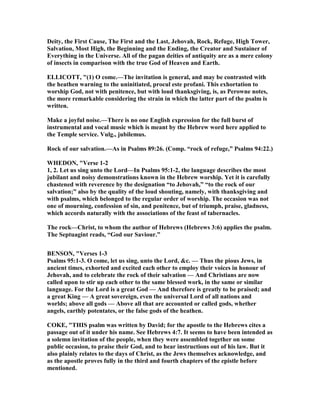
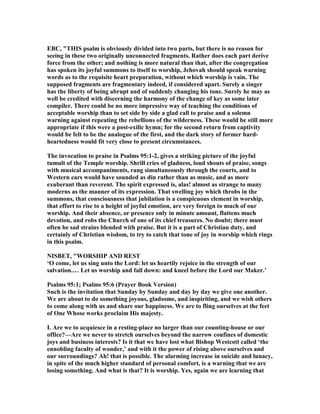
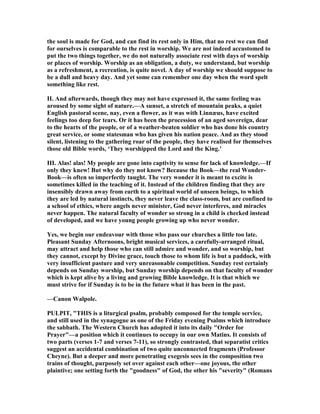
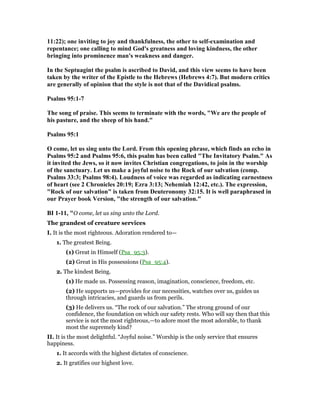
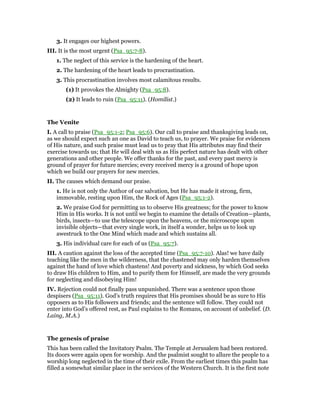
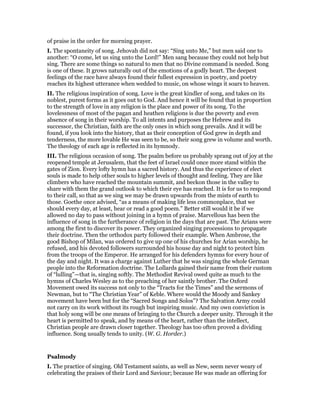
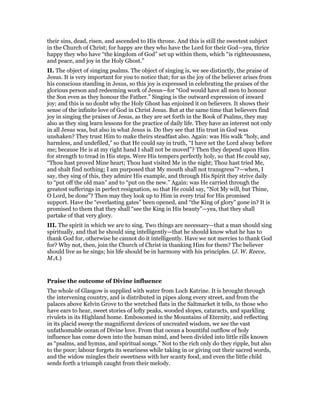
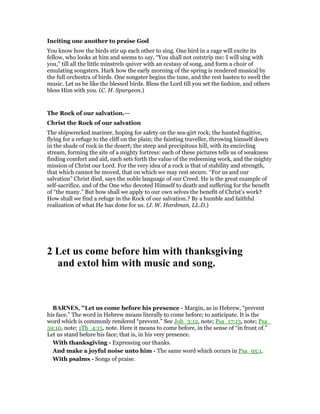
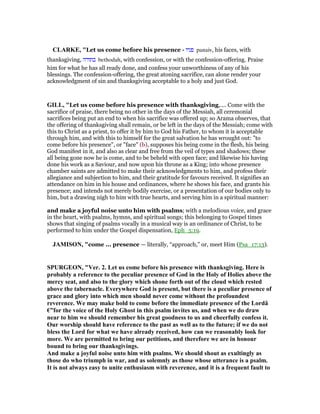
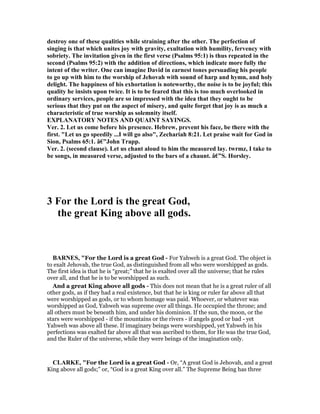
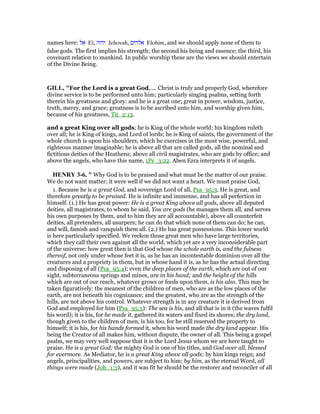
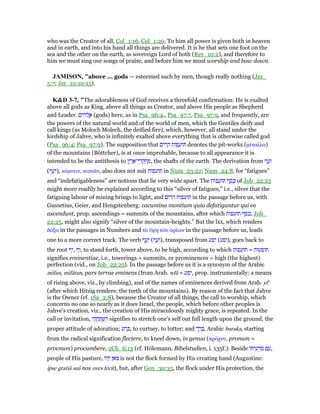
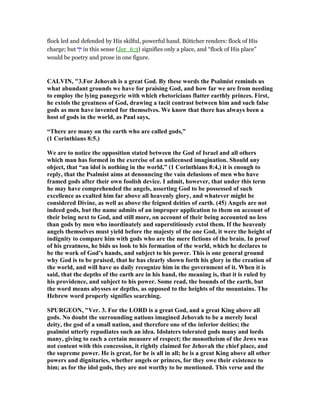
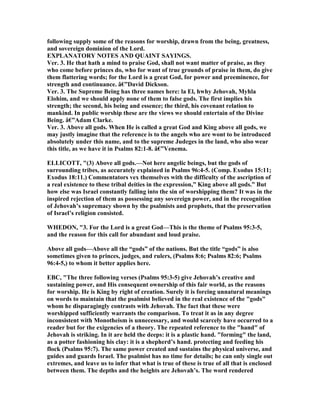
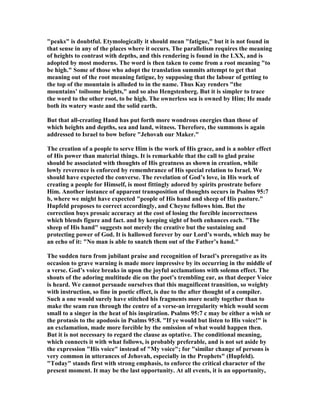
![and therefore to be grasped and used. A doleful history of unthankfulness lay
behind; but still the Divine voice sounds, and still the fleeting moments offer space
for softening of heart and docile hearkening. The madness of delay when time is
hurrying on, and the long-suffering patience of God, are wonderfully proclaimed in
that one word, which the Epistle to the Hebrews lays hold of, with so deep insight, as
all-important.
The warning points Israel back to ancestral sins, the tempting of God in the second
year of the Exodus, by the demand for water. [Exodus 17:1-7] The scene of that
murmuring received both names, Massah (temptation) and Meribah (strife). It is
difficult to decide the exact force of Psalms 95:9 b. "Saw My work" is most
naturally taken as referring to the Divine acts of deliverance and protection seen by
Israel in the desert, which aggravated the guilt of their faithlessness. But the word
rendered "and" will, in that case, have to be taken as meaning "although"-a sense
which cannot be established. It seems better, therefore, to take "work" in the
unusual meaning of acts of judgment-His "strange work." Israel’s tempting of God
was the more indicative of hardheartedness that it was persisted in, in spite of
chastisements. Possibly both thoughts are to be combined, and the whole varied
stream of blessings and punishments is referred to in the wide expression. Both
forms of God’s work should have touched these hard hearts. It mattered not
whether He blessed or punished. They were impervious to both. The awful issue of
this obstinate rebellion is set forth in terrible words. The sensation of physical
loathing followed by sickness is daringly ascribed to God. We cannot but remember
what John heard in Patmos from the lips into which grace was poured: "I will spue
thee out of My mouth."
PULPIT, "For the Lord is a great God. Thanks and praise are due to God, in the
first place, because of his greatness (see Psalm cf. 2). "Who is so great a god as our
God?" (Psalms 77:13); "His greatness is unsearchable" (Psalms 145:3). And a great
King above all gods; i.e. "a goat King above all other so called gods"—above the
great of the earth (Psalms 82:1, Psalms 82:6), above angels (Deuteronomy 10:17),
above the imaginary gods of the heathen (Exodus 12:12, etc.)
4 In his hand are the depths of the earth,
and the mountain peaks belong to him.
BAR ES, "In his hand - In his power, or under his control as his own. That is, he](https://image.slidesharecdn.com/psalm95commentary-160617185945/85/Psalm-95-commentary-23-320.jpg)
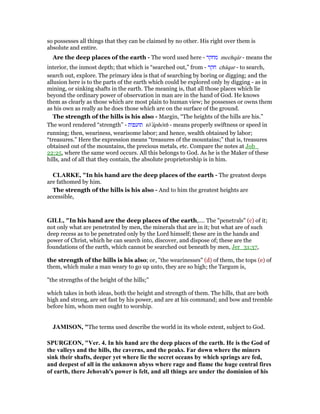
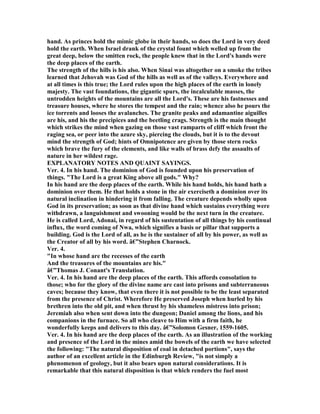
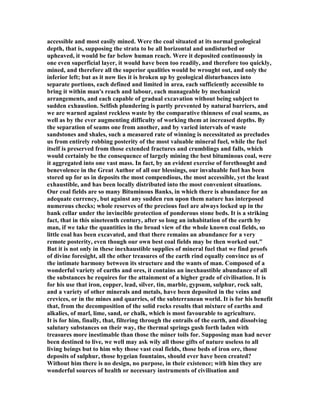
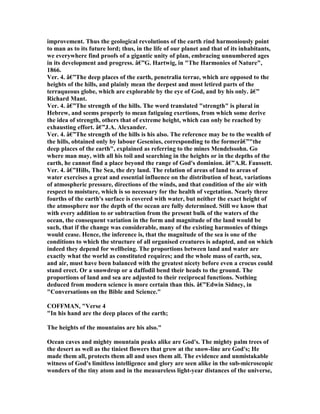
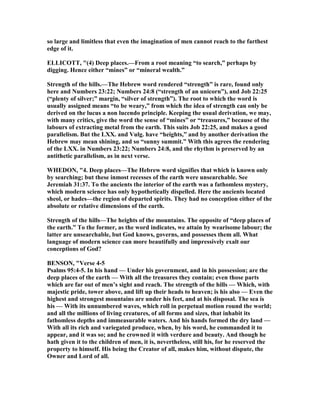
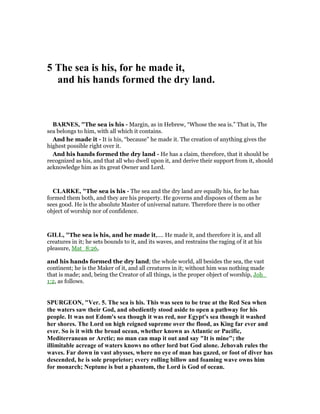
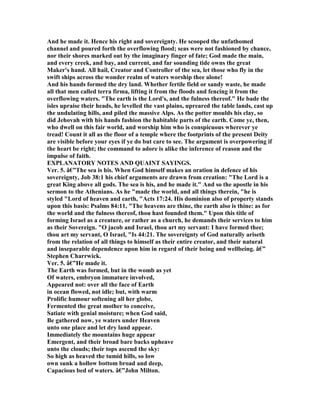
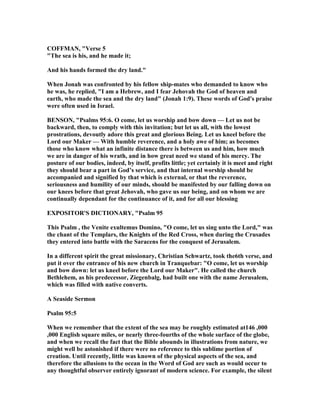
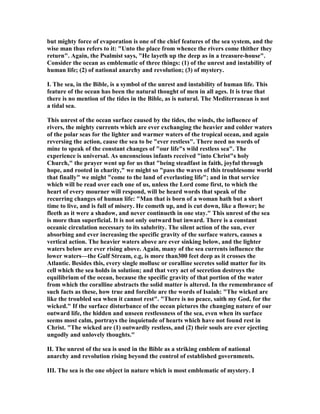
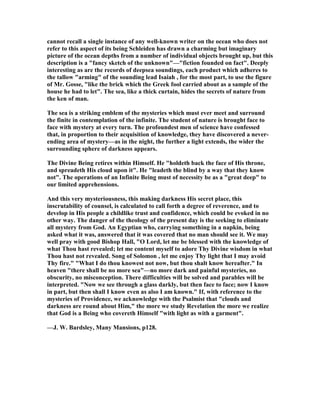
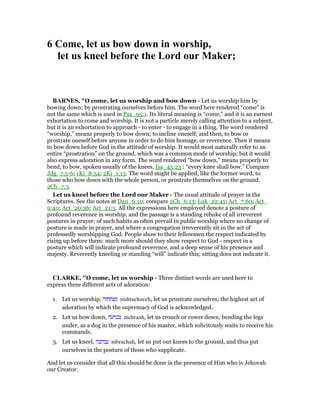
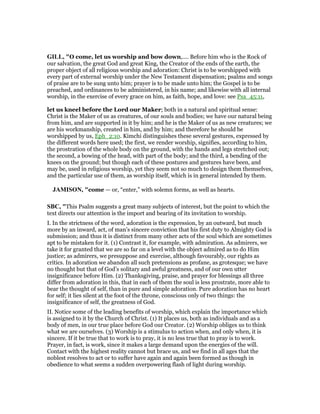
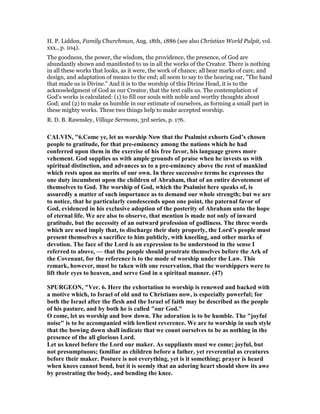
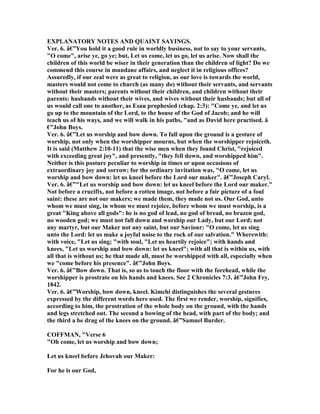
![And we are the people of his pasture, and the sheep of his hand.
Today, oh that ye would hear his voice."
"Oh come" (Psalms 95:6) in the Latin is Venite, adopted as the opening word of the
chorus in the famed Latin hymn, Adeste Fideles, "Oh Come All Ye Faithful,"[5] in
which hymn the line, Venite Adoremus, is repeated three times.
"The people of his pasture" (Psalms 95:7). We might have expected "sheep of his
pasture" here, since it is sheep and not people who need pasture. However, such
mixed metaphors are very common in scripture. Moreover, in this arrangement, the
metaphor of the Lord himself as "The Good Shepherd" automatically comes to
mind.
"Today, oh that ye would hear his voice" (Psalms 95:7). These words form the
opening line in Hebrews 3:7, where this passage is used as the background of what
is written there, Psalms 95:11, being quoted directly. "The passage in Hebrews 3:7-
4:13, expounding this psalm, forbids us to confine its thrust to Israel. "The `Today'
of which it speaks is this very moment; the `ye' is none other than ourselves, and the
promised `rest' is not Canaan, but salvation."[6]
One of the most important revelations in the ew Testament turns upon this very
passage. Hebrews 4:4 ties the "rest" mentioned in Psalms 95:11 with God's "rest"
on the seventh day of creation, demanding that the present time, "this very
moment," as Kidner expressed it, be identified with God's resting "on the seventh
day." The meaning of this is profound. H. Cotterill, the bishop of Edinburgh,
declared that from this passage in Hebrews (Hebrews 7:3-4:13), "We must conclude
that the seventh day of God's rest which followed the six days of creation is not yet
completed."
WHEDO , "6. Worship… bow down… kneel—Three different words, expressive of
the humblest form of bodily prostration before a superior, and repeated for
intensity.
Kneel before the Lord—Literally, Kneel to the face of Jehovah; in his immediate
presence—a spiritual anticipation of Hebrews 10:22. The outward homage must
arise from, and sincerely express, the inward feeling and desire. “In the shell of the
kneeling there must be contained the kernel of unreserved surrender, which
manifests itself in willing obedience.”—Hengstenberg.
EXPOSITOR'S DICTIO ARY, "Psalm 95:6
These words contain a spirit-stirring call to sing God"s praise.
I. Who that has any true piety in his heart will not in his first moments of waking
bethink him of the great Power who has watched over him, and kept him alive, and](https://image.slidesharecdn.com/psalm95commentary-160617185945/85/Psalm-95-commentary-38-320.jpg)
![desire to make some acknowledgment of His goodness?
II. The contemplation of God"s works seen in the creation is calculated to fill our
souls with noble and worthy thoughts about God. It is calculated to make us humble
in our estimate of ourselves, as forming a small part in the mighty whole.
III. And these two things—high reverence for the Holy God, coupled with a sense of
our own unworthiness, help to make accepted worship.
IV. When we come to present ourselves before God, let us remember the amazing
difference and distance between ourselves and the object of our worship.
—R. D. B. Rawnsley, Village Sermons (3Series), p176.
SIMEO , "DEVOTIO TO GOD RECOMME DED A D E FORCED
Psalms 95:6-11. O come, let us worship and bow down: let us kneel before the Lord
our Maker. For he is our God; and we are the people of his pasture, and the sheep of
his hand. To-day if ye will hear his voice, harden not your heart, as in the
provocation, and as in the day of temptation in the wilderness; when your fathers
tempted me, proved me, and saw my work. Forty years long was I grieved with this
generation, and said, It is a people that do err in their heart, and they have not
known my ways; unto whom I sware in my wrath, that they should not enter into
my rest.
I the former part of this psalm, the Jewish people, for whom it was composed,
mutually exhorted each other: in the latter part, God himself is the speaker: and the
manner in which this latter part is cited in the Epistle to the Hebrews, shews, that
the whole psalm is as proper for the use of the Christian, as it was of the Jewish,
Church. The peculiar circumstance of its consisting of a mutual exhortation is there
expressly noticed: and noticed with particular approbation: “Exhort one another
daily, while it is called To-day [ ote: Hebrews 3:13.].” This hint the Compilers of
our Liturgy attended to, when they appointed this psalm to be read constantly in the
Morning Service, as introductory to the other psalms that should come in rotation:
and, as being so appointed, it deserves from us a more than ordinary attention.
In discoursing upon it, we shall notice,
I. The exhortation—
[The proper object of our worship is here described. As addressed to the Jews, the
terms here used would fix their attention on Jehovah, as contra-distinguished from
all false gods: but, as addressed to Christians, they lead our minds to the Lord Jesus
Christ, who is “God with us,” even “God over all, blessed for evermore.” He is our
Maker; for “by him were all things created, both which are in heaven and in earth
[ ote: John 1:3.].” He is “the good Shepherd, who laid down his life for his sheep,”
and who watches over them, and preserves them day and night [ ote: John 10:11.](https://image.slidesharecdn.com/psalm95commentary-160617185945/85/Psalm-95-commentary-39-320.jpg)
![Hebrews 13:20. Ezekiel 34:11-16.]. — — — Him then we must worship with all
humility of mind, “bowing down, and kneeling before him.” At his hands must we
seek for mercy, even through his all-atoning sacrifice — — — and from him, as our
living Head, must we look for all necessary supplies of grace and peace — — —
O come, let us thus approach him! let us do it not merely in the public services of
our Church, but in our secret chambers; and not occasionally only, but constantly;
having all our dependence upon him, and all our expectations from him.]
That this exhortation may not be in vain, we entreat you to consider,
II. The warning with which it is enforced—
[The Jews who, in the wilderness, disobeyed the heavenly call, were never suffered
to enter into the land of Canaan. In the judgments inflicted upon them, they are
held forth as a warning to us [ ote: 1 Corinthians 10:1-11.]. Like them, we have
seen all the wonders of God’s love, in delivering us from a far sorer than Egyptian
bondage. Like them, we have had spiritual food administered to us in rich
abundance in the Gospel of Christ. And if, like them, we harden our hearts, and
rebel against our God, like them, we must be excluded from the heavenly Canaan.
They by their obstinacy provoked God to exclude them with an oath: O that we may
never provoke him to “swear that we also shall never enter into his rest!” That we
are in danger of bringing this awful judgment on ourselves is evident from the
intimation given us by the Apostle Jude [ ote: ver. 5.], and yet more plainly from
the warnings which St. Paul founds on this very passage [ ote: Hebrews 3:7-19;
Hebrews 4:1.] — — — Let us then “hear the voice” of our good Shepherd, ere it be
too late. Let us “grieve him” no longer — — — but let us turn to him with our
whole hearts — — — Caleb and Joshua were admitted into Canaan, because “they
followed the Lord fully:” let us follow him fully, and we shall certainly attain the
promised rest.]
After the example of St. Paul, we would with all earnestness caution you against,
1. Unbelief—
[The Jews believed neither the promises nor the threatenings of God, and therefore
they perished. Let us beware lest we fall after the same example of unbelief [ ote:
Hebrews 4:12.]. If we will not believe that we stand in need of mercy to the extent
that God has declared, or that the service of God is so reasonable and blessed as he
has represented it to be, or that the judgments of God shall infallibly come on all
who refuse to serve him, there is no hope: we must perish, notwithstanding all the
offers of mercy that are sent to us: for “the word preached cannot profit us, if it be
not mixed with faith in them that hear it [ ote: Hebrews 4:2.].”]
2. Hardness of heart—
[As Israel hardened themselves against God when his messages were sent them by](https://image.slidesharecdn.com/psalm95commentary-160617185945/85/Psalm-95-commentary-40-320.jpg)
![Moses, so do many now harden themselves against the word preached by the
ministers of Christ. They “puff at” all the judgments denounced against them [ ote:
Psalms 10:4-5.]. But “who ever hardened himself against God, and prospered?” O!
“will your hearts be stout in the day that he shall deal with you? and will you
thunder with a voice like his?” Be persuaded: humble yourselves before him, yea,
“bow down and kneel before him,” and never cease to cry for mercy, till he has
turned away his anger, and spoken peace to your souls.]
3. Delay—
[“To-day,” says the Psalmist: “To-day, while it is called To-day,”says the Apostle
Paul: and “To-day,” would I say: yes, Brethren, “to-day” “harden not your hearts;”
for you know not what a day may bring forth. Before another day, you may be
taken into the eternal world; or, if not, you may provoke God to swear in his wrath,
that you shall never enter into his rest; and then your remaining days will answer no
other end, than to fill up the measure of your iniquities. But surely you have grieved
him long enough already; some of you twenty, some thirty, some perhaps even
“forty years.” Let there be an end of this rebellion against your Maker and your
Redeemer; and let this, which is with him the day of grace, be to you “the day of
salvation.”]
PULPIT, "O come, let us worship and bow down: let us kneel. The outward and
visible worship of the body is required of man, no less than the inward and spiritual
worship of the soul. Before the Lord our Maker; i.e. "who has made us what we
are—created us, redeemed us, taken us to be his people" (comp. Deuteronomy 32:6;
Psalms 100:3; Psalms 102:18; Psalms 149:2; Isaiah 29:23; Isaiah 43:21; Isaiah 44:2,
etc.).
7 for he is our God
and we are the people of his pasture,
the flock under his care.
Today, if only you would hear his voice,
BAR ES, "For he is our God - Not only the God whom we worship as the true
God, but One who has revealed himself to us as our God. We worship him as God - as](https://image.slidesharecdn.com/psalm95commentary-160617185945/85/Psalm-95-commentary-41-320.jpg)
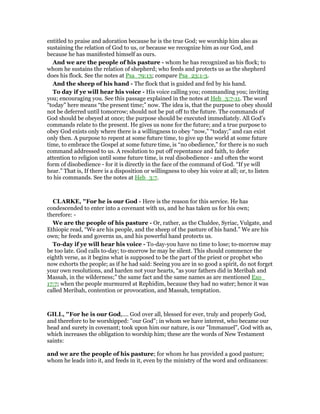
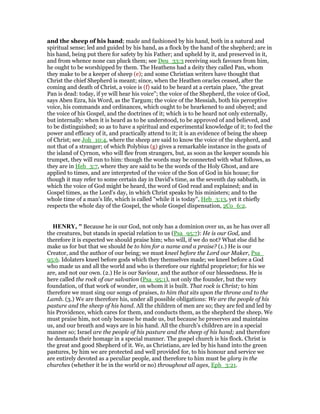
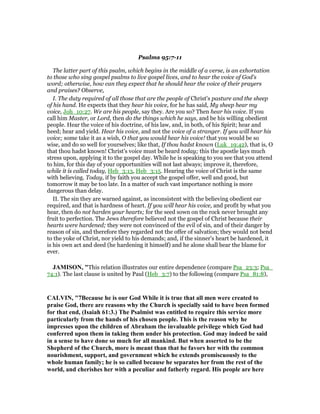
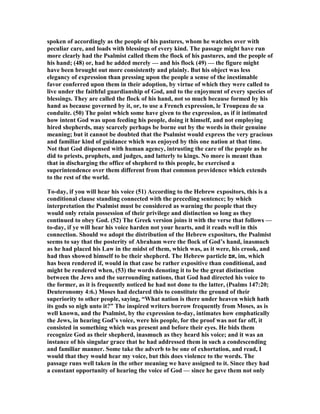
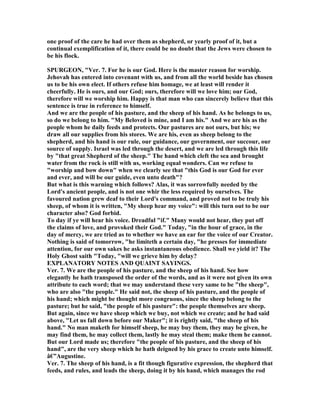
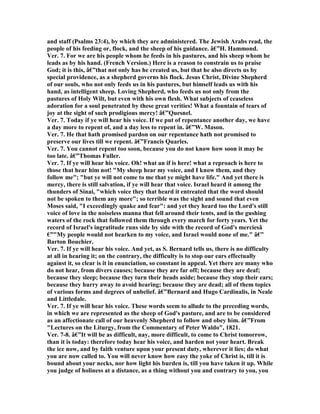
![will never like it. Come a little nearer to it; do but take it in, actually engage in it,
and you will find religion carries meat in its mouth; it is of a reviving, nourishing,
strengthening nature. It brings that along with it, that enables the soul cheerfully to
go through with it. —Thomas Cole (1627-1697) in the "Morning Exercises."
ELLICOTT, "Verse 7
(7) To-day if . . .—In joining this clause with Psalms 95:8-9 the Authorised Version
follows the LXX. The Masoretic text connects it with the preceding part of the verse,
and there seems no good reason for departing from that arrangement. Indeed, the
change from the third person, “his voice,” to the first, “tempted me,” in the same
sentence is intolerable even in Hebrew poetry. or is there any necessity to suppose
the loss of a line. Render: “For He is our God, and we are the people of his pasture,
the sheep of his hand. Today would that ye would hearken to his voice.” The
Oriental custom of leading flocks by the voice is doubtless alluded to, as in John
10:4. otice the resemblance in Psalms 95:6-7 to Psalms 100:3-4.
WHEDO , "7. For he is our God—The reasons for this lively, willing, and
unreserved devotion were, in Psalms 95:3-5, drawn from the greatness of God as
creator and governor of the world. In Psalms 95:6-7 the motives appeal more
directly to the heart and the moral feelings. He is “our God,” “our Maker,” and we
are his “people,” his “sheep.”
Sheep of his hand—That is, we are guided, cared for, and protected by “his hand,”
his personal attention. Psalm 77:21; Psalms 100:3; Psalms 23:3-4.
Today—The “to-day,” or this day, indicates that a decisive moment, a crisis, had
come. So the apostle applies it (Hebrews 3:7-11) to the Jews of his day, who stood,
with reference to the gospel, as the Hebrews at Kadesh did in reference to Canaan.
Thus it applies to every sinner each moment of his probation. “Hereby is meant the
whole time by which Christ speaketh by his gospel.”—Ainsworth.
If ye will hear his voice—Taking the conjunction here in its conditional sense, the
apodosis, or concluding clause, seems obscure. Hengstenberg supplies it by reading:
“‘If ye will hear his voice,’ he will bless you, his people.” This accords with the
passage (Exodus 23:22,) “If thou shalt indeed obey his voice, and do all that I speak,
then I will be an enemy unto thine enemies, and an adversary unto thine
adversaries.” But it equally answers the grammatical and doctrinal demand to
supply, as the sense implies, ,אן (then, on this account,) after “voice,” and read: “To
day, if ye will hear his voice, [then] harden not your hearts.” The hearing implies
heeding— hearing with a view to obeying—which is impossible while unbelief
hardens the heart and perverts the will. The conditioning protasis does not
anticipate a promissory apodosis, but a caution; not the blessings which flow upon
hearing, but the moral preparation implied in obedient hearing.
BE SO ,"Psalms 95:7. For he is our God — He not only has dominion over us, as
he has over all the creatures, but stands in a special relation to us. He is our God in
a peculiar sense, and therefore it would be most unreasonable and wicked if we](https://image.slidesharecdn.com/psalm95commentary-160617185945/85/Psalm-95-commentary-48-320.jpg)
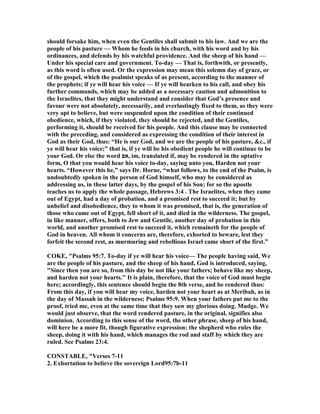
![Israel, however, had been a wayward flock in the past. This led the writer to warn
the people to avoid the sins that had resulted in the wilderness wanderings, "the
world"s longest funeral march." [ ote: Wiersbe, The . . . Wisdom . . ., p265.] At
Meribah (lit. strife; Exodus 17:1-7; umbers 20:2-13) and Massah (lit. testing;
Exodus 17:1-7) Israel tested God by demanding that He provide for them on their
terms. They should have simply continued to trust and obey God. Perhaps the
writer mentioned these rebellions and not others because they so clearly reveal the
ingratitude and willfulness that finally resulted in God sentencing that generation to
die in the wilderness. Their actions betrayed the fact that they had not learned
God"s ways, specifically, that He would do what was best for them in His own time
and way. That generation could have entered into rest in the land of milk and
honey. Likewise, believers who fail to follow their Good Shepherd faithfully can
look forward to a life of hardship and limited blessing. In view of the urgency of this
exhortation, the writer began it by calling for action "today."
The writer to the Hebrews quoted Psalm 95:7-11 in order to urge Christians to
believe God and move ahead in faith. ot obtaining rest, for the Christian, means
failing to enter into all the blessings that could have been his (or hers) if he (or she)
had faithfully trusted and obeyed God.
This psalm is a sober reminder that praise needs to connect with trust and
obedience. It also anticipates the time when those who follow the Shepherd
faithfully will reign with Him in His beneficent rule over the earth (cf. Psalm 2; 2
Timothy 2:12 a; Revelation 3:21; et al.).
PULPIT, "For he is our God. A second, and a more urgent, reason for worshipping
God. ot only is he a "great God" (Psalms 95:3), but he is also "our God"—our
own God—brought into the closest personal relationship with us. And we are the
people of his pasture, and the sheep of his hand (comp. Psalms 74:1; Psalms 79:13;
Psalms 80:1, etc.). We are led by him, tended by him, fed by him, folded by him. We
owe everything to his shepherding.
K&D , "Psalms 95:7-11
The second decastich begins in the midst of the Masoretic Psa_95:7. Up to this point
the church stirs itself up to a worshipping appearing before its God; now the voice of
God (Heb_4:7), earnestly admonishing, meets it, resounding from out of the sanctuary.
Since ְ ע ַמ ָשׁ signifies not merely to hear, but to hear obediently, Psa_95:7 cannot be a
conditioning protasis to what follows. Hengstenberg wishes to supply the apodosis:
“then will He bless you, His people;” but ם ִא in other instances too (Psa_81:9; Psa_
139:19; Pro_24:11), like ,לוּ has an optative signification, which it certainly has gained by
a suppression of a promissory apodosis, but yet without the genius of the language
having any such in mind in every instance. The word ּום ַה placed first gives prominence
to the present, in which this call to obedience goes forth, as a decisive turning-point. The
divine voice warningly calls to mind the self-hardening of Israel, which came to light at
Merîbah, on the day of Massah. What is referred to, as also in Psa_81:8, is the tempting](https://image.slidesharecdn.com/psalm95commentary-160617185945/85/Psalm-95-commentary-50-320.jpg)
![of God in the second year of the Exodus on account of the failing of water in the
neighbourhood of Horeb, at the place which is for this reason called Massah u-Merıbah
(Exo_17:1-7); from which is to be distinguished the tempting of God in the fortieth year
of the Exodus at Merıbah, viz., at the waters of contention near Kadesh (written fully Mê-
Merıbah Kadesh, or more briefly Mê-Merıbah), Num_20:2-13 (cf. on Psa_78:20). Strictly
כמריבה signifies nothing but instar Meribae, as in Psa_83:10 instar Midianitarum; but
according to the sense, ְⅴ is equivalent to ל ַע ְⅴ. Psa_106:32, just as ּוםי ְⅴ is equivalent to
ּוםי ְב ִⅴ. On ר ֶשׁ ֲ,א quum, cf. Deu_11:6. The meaning of י ִל ֳֽע ָפ אוּ ָם־רַ is not they also (גם as in
Psa_52:7) saw His work; for the reference to the giving of water out of the rock would
give a thought that is devoid of purpose here, and the assertion is too indefinite for it to
be understood of the judgment upon those who tempted God (Hupfeld and Hitzig). It is
therefore rather to be rendered: notwithstanding (ho'moos, Ew. §354, a) they had (=
although they had, cf. גם in Isa_49:15) seen His work (His wondrous guiding and
governing), and might therefore be sure that He would not suffer them to be destroyed.
The verb קוּט coincides with κοτέω, κότος. ּור ְ.ען , for which the lxx has τሀ γενεᇱ ᅚκείνη, is
anarthrous in order that the notion may be conceived of more qualitatively than
relatively: with a (whole) generation. With ר ַמ ִאָו Jahve calls to mind the repeated
declarations of His vexation concerning their heart, which was always inclined towards
error which leads to destruction - declarations, however, which bore no fruit. Just this
ineffectiveness of His indignation had as its result that (ר ֶשׁ ֲ,א not ᆋτι but ᆢστε, as in Gen_
13:16; Deu_28:27, Deu_28:51; 2Ki_9:37, and frequently) He sware, etc. (ם ִא = verily not,
Gesen. §155, 2, f, with the emphatic future form in ûn which follows). It is the oath in
Num_14:27. that is meant. The older generation died in the desert, and therefore lost the
entering into the rest of God, by reason of their disobedience. If now, many centuries
after Moses, they are invited in the Davidic Psalter to submissive adoration of Jahve,
with the significant call: “To-day if ye will hearken to His voice!” and with a reference to
the warning example of the fathers, the obedience of faith, now as formerly, has
therefore to look forward to the gracious reward of entering into God's rest, which the
disobedient at that time lost; and the taking possession of Canaan was, therefore, not as
yet the final ה ָנוּח ְמ (Deu_12:9). This is the connection of the wider train of thought which
to the writer of the Epistle to the Hebrews Heb_3:1, Heb_4:1, follows from this text of
the Psalm.
8 “Do not harden your hearts as you did at
Meribah,[a]
as you did that day at Massah[b] in the
wilderness,](https://image.slidesharecdn.com/psalm95commentary-160617185945/85/Psalm-95-commentary-51-320.jpg)
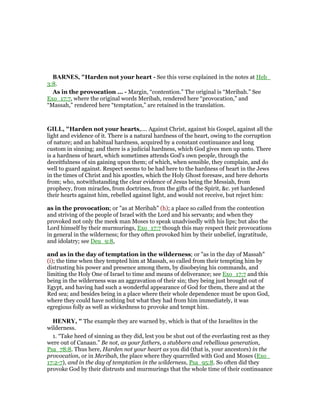
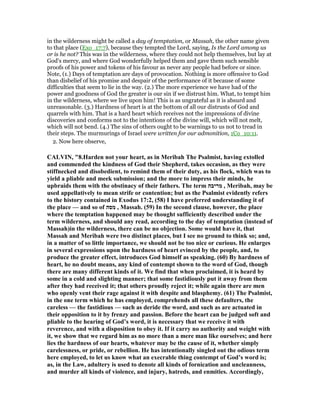
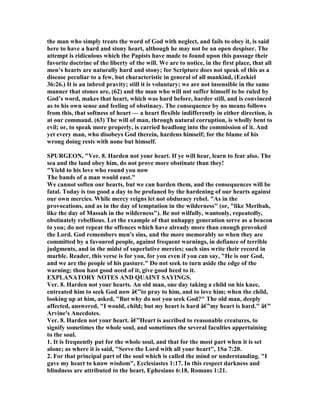
![3. For the will: as when heart and soul are joined together, the two essential faculties
of the soul are meant, namely, the mind and will: soul put for the mind, heart for the
will "Serve the Lord with all your heart and with all your soul", De 6:13.
4. For the memory. "I have hid thy word in my heart", saith the prophet, Psalms
119:11. The memory is that faculty wherein matters are laid up and hid.
5. For the conscience. It is said that "David's heart smote him", that is, his
conscience, 1 Samuel 24:5, 2 Samuel 24:10. Thus is heart taken, 1 John 3:20-21.
6. For the affections: as where it is said, "Thou shalt love the Lord thy God with all
thy heart, and with all thy soul, and with all thy mind", Matthew 22:37. By the mind
is meant the understanding faculty; by the soul, the will; by the heart, the affections.
Here in this text the heart is put for the whole soul, even for mind, will, and
affections. For blindness of mind, stubbornness of will, and stupidity of affections go
together. —William Gouge.
Ver. 8. In Massah—in Meribah. Our translators say, in the provocation, in the day
of temptation. But the places were denominated by names taken from the
transactions that occurred in them; and the introduction of those names gives more
liveliness to the allusion. See to the same effect Psalms 81:7; where the Bible
translation retains the proper name. —Richard Mant.
Ver. 8. Let us not fail to notice, that while it is the flock who speak in Psalms 95:1-7,
it is the Shepherd who takes up their expostulating words, and urges them home
himself at Psalms 95:8, to the end, using the argument which by the Holy Ghost is
addressed to us also in Hebrews 3:7-19. There is something very powerful in this
expostulation, when connected with the circumstances that give rise to it. In
themselves, the burst of adoring love, and the full out pouring of affection in Psalms
95:1-7 are irresistibly persuasive; but when (Psalms 95:8) the voice of the Lord
himself is heard (such a voice, using terms of vehement entreaty!) we cannot imagine
expostulation carried further. Unbelief alone could resist this voice; blind,
malignant unbelief alone could repel The flock, and then the Shepherd, inviting men
now to enter the fold. —Andrew A. Bonar.
COFFMA , "Verse 8
"Harden not your hearts, as at Meribah,
As in the day of Massah in the wilderness."
"Massah and Meribah" (Psalms 95:8). These two names are applied to only one
place in Exodus 17:7; and in the passage here, as in Deuteronomy 33:8, they are
used as parallel statements. Ewing referred to them as, "Double names for the same
place."[8]
The unfaithfulness of Israel was principally that of their complaining and
murmuring against God, a behavior that was actually due to their unbelief.
ELLICOTT, "Verse 8
(8) The mention of the guiding voice suggests to the poet to make God Himself
address His people, and with this verse the Divine warning begins.](https://image.slidesharecdn.com/psalm95commentary-160617185945/85/Psalm-95-commentary-55-320.jpg)
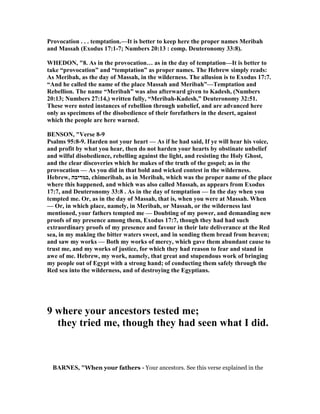
![notes on Heb_3:9.
Tempted me - Tried me; tried my patience, to see how much I would bear. This does
not mean, as it commonly does now with us, to place inducements before one to lead
him into sin, but to try one - to put his patience to the test. This they did, in the case
referred to, by their obduracy and evil conduct.
Proved me - See the notes at Heb_3:9. “And saw my work.” Though they constantly
saw my work; saw my gracious interpositions; saw what I was doing for their own good.
CLARKE, "When your fathers tempted me - Tried me, by their insolence,
unbelief, and blasphemy. They proved me - they had full proof of my power to save and
to destroy. There they saw my works - they saw that nothing was too hard for God.
GILL, "When your fathers tempted me,.... Or, "where" (i); that is, in the
wilderness, particularly at Meribah and Massah; it was Christ they tempted, as appears
from 1Co_10:9.
proved me: had proof of his power, goodness, and mercy, in providing for them, and in
the preservation of them: or "tried" (k) him, his patience, longsuffering, and
forbearance, by their repeated provocations of him:
and saw my work; his work of judgment upon their enemies the Egyptians, by
inflicting plagues upon them, and by the destruction of Pharaoh and his host at the Red
sea; and his work of goodness to them, in bringing them out of bondage, leading them
through the Red sea safely, raining manna about their tents, and giving them water out
of the rock; or particularly his work in consuming them in the wilderness, as he swore he
would, and which they saw with their eyes, and was near forty years a doing. The Syriac
version joins the "forty years" at the beginning of the next verse to this; the phrase
standing in such a situation as to be connected with both, and is true of each; so the
apostle uses it both ways, Heb_3:9.
HE RY, "(1.) The charge drawn up, in God's name, against the unbelieving
Israelites, Psa_95:9, Psa_95:10. God here, many ages after, complains of their ill
conduct towards him, with the expressions of high resentment. [1.] Their sin was
unbelief: they tempted God and proved him; they questioned whether they might take
his word, and insisted upon further security before they would go forward to Canaan, by
sending spies; and, when those discouraged them, they protested against the sufficiency
of the divine power and promise, and would make a captain and return into Egypt,
Num_14:3, Num_14:4. This is called rebellion, Deu_1:26, Deu_1:32. [2.] The
aggravation of this sin was that they saw God's work; they saw what he had done for
them in bringing them out of Egypt, nay, what he was now doing for them every day, this
day, in the bread he rained from heaven for them and the water out of the rock that
followed them, than which they could not have more unquestionable evidences of God's
presence with them. With them even seeing was not believing, because they hardened
their hearts, though they had seen what Pharaoh got by hardening his heart. [3.] The
causes of their sin. See what God imputed it to: It is a people that do err in their hearts,
and they have not known my ways. Men's unbelief and distrust of God, their](https://image.slidesharecdn.com/psalm95commentary-160617185945/85/Psalm-95-commentary-57-320.jpg)
![murmurings and quarrels with him, are the effect of their ignorance and mistake. First,
Of their ignorance: They have not known my ways. They saw his work (Psa_95:9) and
he made known his acts to them (Psa_103:7); and yet they did not know his ways, the
ways of his providence, in which he walked towards them, or the ways of his
commandments, in which he would have them to walk towards him: they did not know,
they did not rightly understand and therefore did not approve of these. Note, The reason
why people slight and forsake the ways of God is because they do not know them.
Secondly, Of their mistake: They do err in their heart; they wander out of the way; in
heart they turn back. Note, Sins are errors, practical errors, errors in heart; such there
are, and as fatal as errors in the head. When the corrupt affections pervert the judgment,
and so lead the soul out of the ways of duty and obedience, there is an error of the heart.
[4.] God's resentment of their sin: Forty years long was I grieved with this generation.
Not, The sins of God's professing people do not only anger him, but grieve him,
especially their distrust of him; and God keeps an account how often (Num_14:22) and
how long they grieve him. See the patience of God towards provoking sinners; he was
grieved with them forty years, and yet those years ended in a triumphant entrance into
Canaan made by the next generation. If our sins have grieved God, surely they should
grieve us, and nothing in sin should grieve us so much as that.
JAMISO 8-11, "warning against neglect; and this is sustained by citing the
melancholy fate of their rebellious ancestors, whose provoking insolence is described by
quoting the language of God’s complaint (Num_14:11) of their conduct at Meribah and
Massah, names given (Exo_17:7) to commemorate their strife and contention with Him
(Psa_78:18, Psa_78:41).
CALVI , "9When your fathers tempted me, they proved me The Psalmist
insinuates, as I have already remarked, that the Jews had been from the first of a
perverse and almost intractable spirit. And there were two reasons which made it
highly useful to remind the children of the guilt chargeable upon their fathers. We
know how apt men are to follow the example of their predecessors; custom begets a
sanction; what is ancient becomes venerable, and such is the blinding influence of
home example, that whatever may have been done by our forefathers passes for a
virtue without examination. We have an instance in Popedom, of the audacity with
which the authority of the fathers is opposed to God’s word. The Jews were of all
others most liable to be deceived upon this side, ever accustomed as they were to
boast of their fathers. The Psalmist accordingly would detach them from the fathers,
by taking notice of the monstrous ingratitude with which they had been chargeable.
A second reason, and one to which I have already adverted, is, that he would show
them the necessity in which they stood of being warned upon the present subject.
Had their fathers not manifested a rebellions spirit, they might have retorted by
asking the question, Upon what ground he warned them against hardness of heart,
their nation having hitherto maintained a character for docility and tractableness?
The fact being otherwise — their fathers having from the first been perverse and
stubborn, the Psalmist had a plain reason for insisting upon the correction of this
particular vice.
There are two ways of interpreting the words which follow. As tempting God is](https://image.slidesharecdn.com/psalm95commentary-160617185945/85/Psalm-95-commentary-58-320.jpg)
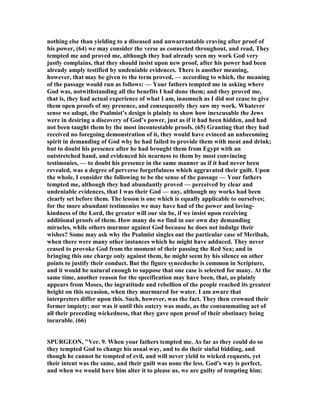
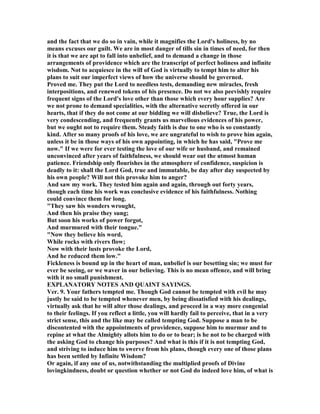
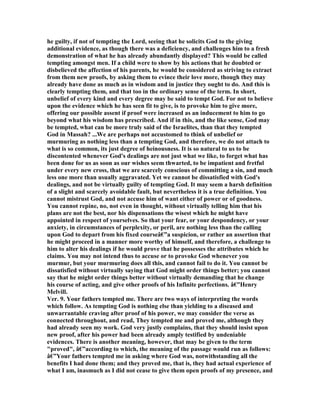
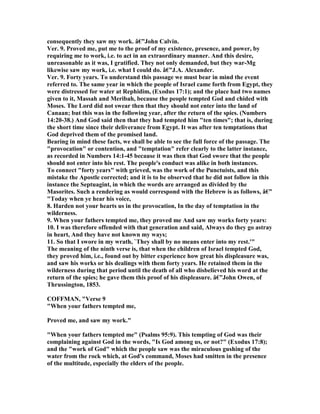
![ELLICOTT, "Verse 9
(9) Proved me.—Properly, of trying metals. This term is used of man’s attitude
towards Providence, both in a good and bad sense (Malachi 3:10; Malachi 3:15).
And saw my work.—Better (as in Isaiah 49:15), Yea, they saw my works, watched,
that is, God’s dealings with ever the same readiness to murmur and repine, and try
the Divine patience.
WHEDO , "9. When your fathers tempted me—Where “your fathers tempted.”
The pronoun here refers to place— “the wilderness.”
Tempted—Required proof by visible tests. See on Psalms 78:18. The temptations by
Israel had been great: at the Red Sea, (Exodus 14:11-12;) at Marah, (Exodus 15:23-
24;) at the Desert of Sin, (Exodus 16:1-3;) at Rephidim, (Exodus 17:1-3;) at Sinai,
(Exodus 43;) in the matter of adab and Abihu, (Leviticus 10;) in their clamour for
meat to eat, ( umbers 11:4-6;) in the matter of Aaron and Miriam, ( umbers 12;) of
the spies, ( umbers 13, 14;) of Korah and his company, ( umbers 16;) at Kadesh,
( umbers 20:1-5;) near Mount Hor, ( umbers 21:4-6;) in the matter of Baal-peor,
( umbers 25.)
Proved me—Put me to the proof of my power and faithfulness.
Saw my work—The “work” of God, here referred to, was not the punishment which
followed their sin, but the whole series of miracles in Egypt and the wilderness. The
apostle uses the plural, “works,” Hebrews 3:9. The idea is one of astonishment, that,
after having seen these miracles, they should yet fall into the sin of unbelief and
disobedience. The particle ,גם (gam,) translated and, here, as in some other
instances, takes the adversative sense of yet, although— “Where your fathers
tempted me, proved me, although they saw [equal to had seen] my work.”
10 For forty years I was angry with that
generation;
I said, ‘They are a people whose hearts go
astray,
and they have not known my ways.’](https://image.slidesharecdn.com/psalm95commentary-160617185945/85/Psalm-95-commentary-63-320.jpg)
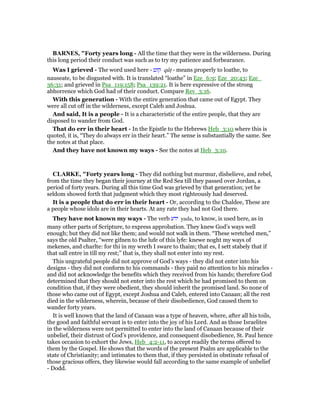
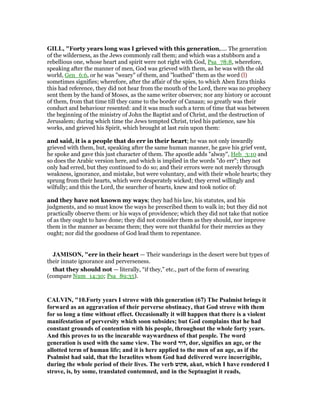
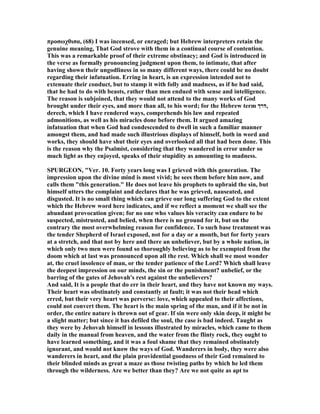
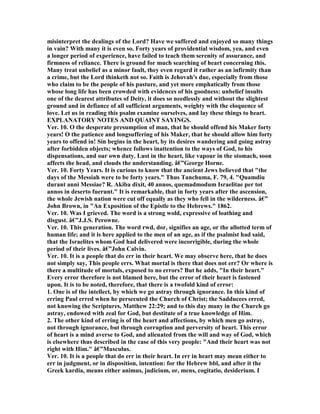
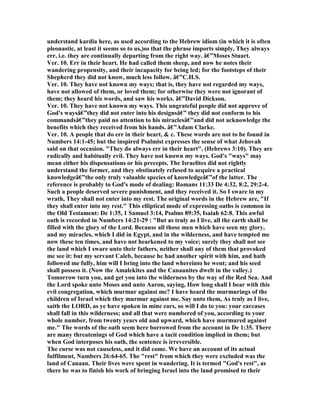
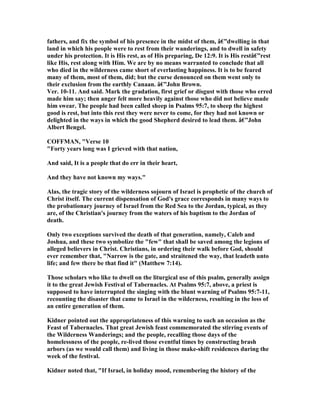
![Wilderness, and perhaps romanticizing it (as all of us are tempted to do for `the
good old days'), actually received this warning at the Feast of Tabernacles, it would
have been a cold douche of realism."[9] It would have starkly reminded the whole
nation of how utterly displeased was the Heavenly Father with that first generation
that he led out of Egyptian slavery. Let it be noted that this psalm's being identified
with the feast of Tabernacles cannot exclude its Davidic authorship.
WHEDO , "10. Forty years long was I grieved—That is, disgusted, made to loathe,
as the word imports. This not only illustrates the long suffering of God, but the
incurable malignity of their sin. After all their bitter experience and rejection at
Kadesh, the remaining thirty-eight years of wandering in the desert offered nothing
pleasing to God, and effected no radical change in their manners. othing is
recorded of those years of wandering except the names of their principal
encampments. See on Psalms 90:9.
Generation—To be understood qualitatively and not quantitatively; of the nature or
kind of people, rather than the simple, aggregate body of those who perished in the
wilderness. See note on Psalms 22:30.
Err in their heart—The evil lay deep in the moral nature, as at enmity with God.
“Err,” here, means confused, wandering; descriptive of one who has lost his way,
and who fails in all his efforts to regain it. This was because of the state of their
heart, which made them inapt to learn God’s ways.
BE SO , "Psalms 95:10. Forty years long, &c. — or did they cease their
discontented murmurings and distrust of me; but persisted in their stubborn
infidelity and disobedience for the space of forty years; was I grieved with this
generation — Or rather, with that generation, which then lived, who were your
ancestors; and said, It is a people that do err in their heart — They not only sin
through infirmity, and the violence and surprise of temptation, but their hearts are
insincere and inconstant, and given to backsliding, and therefore there is no hope of
their amendment. And they have not known — Or, they do not know, namely, with
a practical and useful knowledge; they do not rightly understand, nor duly consider,
nor seriously lay to heart, my ways — That is, either, 1st, My laws, or statutes,
which are frequently called God’s ways; or, rather, 2d, My works, as it is explained
Psalms 95:9, which also are often so called. They do not know nor consider those
great things which I wrought for them and among them.
PULPIT, "Forty years long was I grieved with this generation; rather, with that
generation—the generation that tempted God in the wilderness (see the Revised
Version). And said, It is a people that do err in their heart; literally, a people of
wanderers in heart are these; i.e. "not only are they a people whose feet wander
(Psalms 107:4), but their hearts also have wandered and gone astray from my
paths." And they have not known my ways. "My ways—the ways of my
commandments—are unknown to them, untrodden by them."](https://image.slidesharecdn.com/psalm95commentary-160617185945/85/Psalm-95-commentary-70-320.jpg)
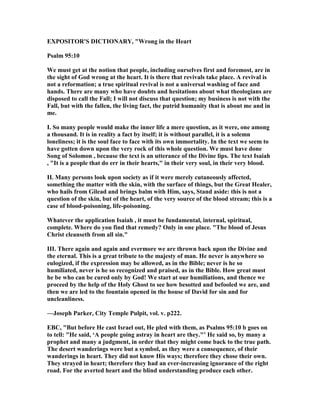
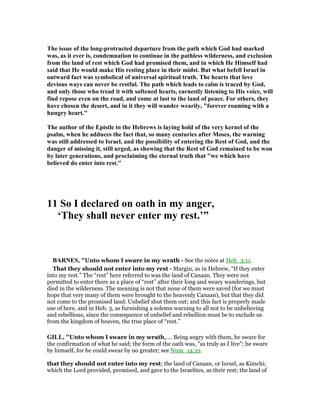
![Israel and Jerusalem, as Jarchi; or the house of the sanctuary, the temple, as the
Targum; which Jehovah chose for his rest, and took it up in it, and where he promised
the Messiah, the Prince of peace, who gives to his people spiritual and eternal rest.
Canaan was typical of the rest which remains for the people of God; the use that
believing Jews, and all Christians under the Gospel dispensation, are to make of this, see
in Heb_3:18.
HE RY, " The sentence passed upon them for their sin (Psa_95:11): “Unto whom I
swore in my wrath, If they shall enter into my rest, then say I am changeable and
untrue:” see the sentence at large, Num_14:21, etc. Observe, [1.] Whence this sentence
came - from the wrath of God. He swore solemnly in his wrath, his just and holy wrath;
but let not men therefore swear profanely in their wrath, their sinful brutish wrath. God
is not subject to such passions as we are; but he is said to be angry, very angry, at sin and
sinners, to show the malignity of sin and the justice of God's government. That is
certainly an evil thing which deserves such a recompence of revenge as may be expected
from a provoked Deity. [2.] What it was: That they should not enter into his rest, the rest
which he had prepared and designed for them, a settlement for them and theirs, that
none of those who were enrolled when they came out of Egypt should be found written
in the roll of the living at their entering into Canaan, but Caleb and Joshua. [3.] How it
was ratified: I swore it. It was not only a purpose, but a decree; the oath showed the
immutability of his counsel; the Lord swore, and will not repent. It cut off the thought
of any reserve of mercy. God's threatenings are as sure as his promises.
Now this case of Israel may be applied to those of their posterity that lived in David's
time, when this psalm was penned; let them hear God's voice, and not harden their
hearts as their fathers did, lest, if they were stiffnecked like them, God should be
provoked to forbid them the privileges of his temple at Jerusalem, of which he had said,
This is my rest. But it must be applied to us Christians, because so the apostle applies it.
There is a spiritual and eternal rest set before us, and promised to us, of which Canaan
was a type; we are all (in profession, at least) bound for this rest; yet many that seem to
be so come short and shall never enter into it. And what is it that puts a bar in their
door? It is sin; it is unbelief, that sin against the remedy, against our appeal. Those that,
like Israel, distrust God, and his power and goodness, and prefer the garlick and onions
of Egypt before the milk and honey of Canaan, will justly be shut out from his rest: so
shall their doom be; they themselves have decided it. Let us therefore fear, Heb_4:1.
CALVI , "11.Wherefore I have sworn in my wrath I see no objection to the relative
,אשר asher, being understood in its proper sense and reading — To whom I have
sworn. The Greek version, taking it for a mark of similitude, reads, As I have sworn
But I think that it may be properly considered as expressing an inference or
conclusion; not as if they were then at last deprived of the promised inheritance
when they tempted God, but the Psalmist, having spoken, in the name of God, of
that obstinacy which they displayed, takes occasion to draw the inference that there
was good reason for their being prohibited, with an oath, from entering the land.
Proportionally as they multiplied their provocations, it became the more evident
that, being incorrigible, they had been justly cut off from God’s rest. (69) The
meaning would be more clear by reading in the pluperfect tense — I had sworn; for
God had already shut them out from the promised inheritance, having foreseen
their misconduct; before he thus strove with them. I have elsewhere adverted to the
explanation which is to be given of the elliptical form in which the oath runs. (70)](https://image.slidesharecdn.com/psalm95commentary-160617185945/85/Psalm-95-commentary-73-320.jpg)
